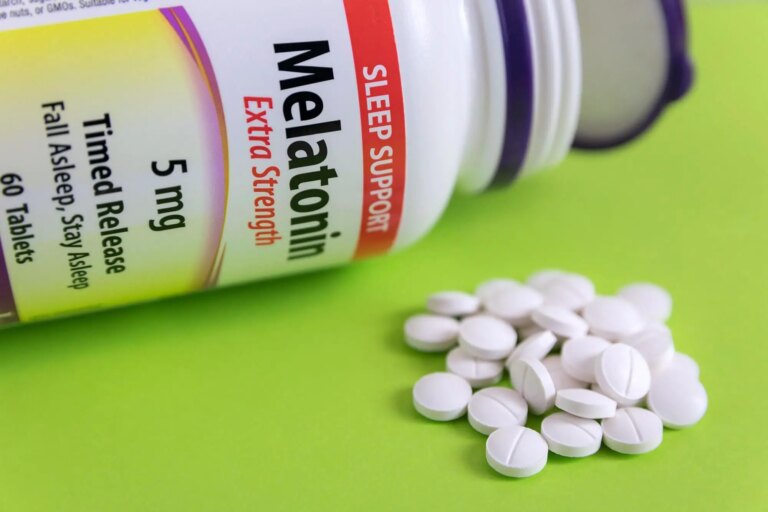Melatonin, a hormone naturally secreted by the pineal gland, is essential in regulating the sleep-wake cycle. Scientific studies support melatonin’s effectiveness as a sleep aid, especially in treating primary sleep disorders, delayed sleep phase syndrome, and jet lag. Research results show that melatonin supplementation reduces sleep latency, improves sleep quality, and increases total sleep time.
Melatonin, a hormone that regulates the sleep-wake cycle, is effective in treating certain sleep disorders and improving sleep quality. However, it is recommended to consult a doctor before use as side effects may occur.
Melatonin, a hormone secreted primarily by the pineal gland, has been the subject of much scientific research due to its role in regulating the sleep-wake cycle.[1] Melatonin, which is naturally produced in response to darkness, plays a role in promoting sleep, making it an area of interest for people seeking non-pharmacological interventions for sleep disorders.
Role of melatonin in sleep
Melatonin production is intrinsically linked to the body’s circadian rhythm, which governs physical, mental and behavioral changes within an approximately 24-hour cycle.[2] It reaches peak levels at night and promotes sleep. Melatonin’s importance lies in its ability to convey information related to ambient light, which helps regulate the sleep-wake cycle.[1]
Melatonin as a sleep aid
The use of melatonin as a sleep aid has been thoroughly researched, and scientific research supports its effectiveness in reducing certain sleep disorders. It has been shown to be effective in treating primary sleep disorders, delayed sleep phase syndrome, and jet lag.[3]
A review of clinical trials noted that melatonin supplementation was effective in reducing sleep latency (the time it takes to fall asleep) and increasing total sleep time compared to placebo. I’m here.[4] Additionally, the study found that melatonin appeared to improve overall sleep quality, with most participants reporting feeling more rested after waking up.
Safety and side effects
Melatonin is generally considered safe for short-term use. However, like any supplement, it is not without potential side effects. Some users have reported experiencing headaches, dizziness, nausea, or drowsiness the next day.[5] As with any supplement or medication, it is advisable to consult a healthcare provider before starting melatonin, especially if you have a pre-existing medical condition or are currently taking other medications. .[6]
Conclusion
Melatonin is a hormone important in regulating sleep and wakefulness. The supplement is expected to improve sleep duration, quality and incidence in people with certain sleep disorders. Short-term use is generally safe, but potential users should be aware of the potential side effects and consult a healthcare provider before beginning use. Future studies should continue to investigate the long-term safety and efficacy of melatonin supplementation, as well as explore its potential uses beyond sleep regulation.
References:
- “New Perspectives on Human Sleep, Circadian Rhythms, and the Role of Melatonin in Their Regulation,” Nava Jisapel, 10 Jan. 2018, Available here. British Journal of Pharmacology.
DOI: 10.1111/bph.14116 - “Melatonin, the Circadian Multi-Oscillator System and Health: A Need for In-Depth Analysis of Peripheral Melatonin Signaling” Ruediger Halderand, Juan Antonio Madrid, Danxian Tan, Russell J. Reiter, September 27, 2011 , Pineal Research Journal.
DOI: 10.1111/j.1600-079X.2011.00934.x - “Therapeutic Actions of Melatonin in Cancer: A Possible Mechanism.” Venkataramanujan Srinivasan, Ph.D., D Warren Spence, M.D., seethikurip R. Pandi-Perumal, M.D., Ilya Trakht, Ph.D. and Daniel P. Cardinali, M.D., September 1, 2008, Integrative. cancer treatment.
DOI: 10.1177/1534735408322846 - “Meta-analysis: Melatonin for the treatment of primary sleep disorders.” Eduardo Ferracioli-Oda, Ahmad Qawasmi and Michael H. Bloch, 17 May 2013, Available here. pro swan.
DOI: 10.1371/journal.pone.0063773 - “The Safety of Melatonin in Humans.” Lars Peter Horst Andersen, Ismail Gegenur, Jacob Rosenberg, Russell J. Reiter, 21 Dec. 2015, Available here. clinical drug investigation.
DOI: 10.1007/s40261-015-0368-5 - “Effects of Exogenous Melatonin on Sleep: A Meta-Analysis” Amnon Brzezinski, Mark G. Vangel, Richard J. Wortman, Gillian Norry, Irina Zhidanova, Abraham Ben Shushan, Ian Ford, 2004 Nov. 11, sleeping pill reviews.
DOI: 10.1016/j.smrv.2004.06.004



